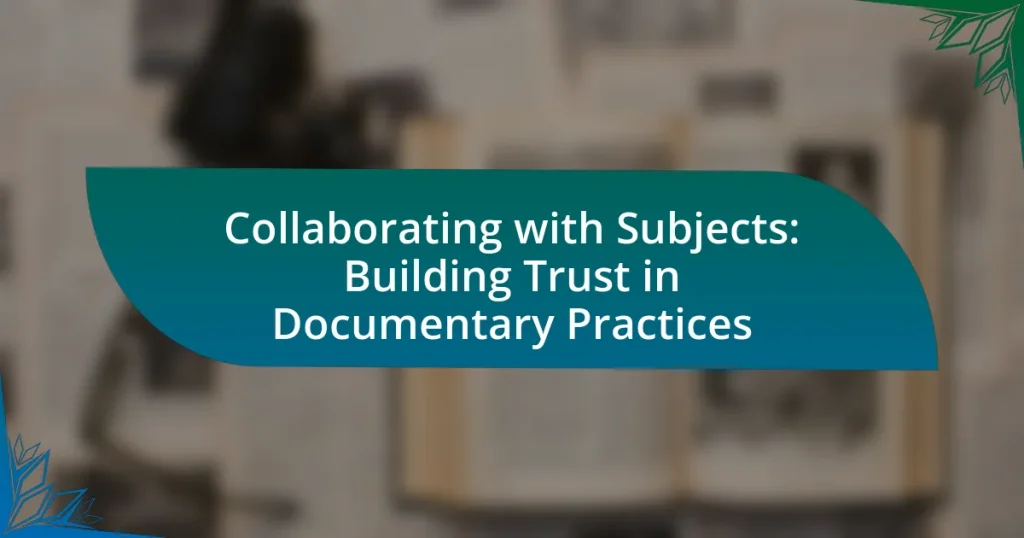The article focuses on the importance of collaboration with subjects in documentary practices, emphasizing the need to build trust and ensure ethical representation. It outlines key elements of trust, such as transparency, respect, and consistency, and discusses how these factors enhance the quality of documentary narratives. The article also addresses the challenges filmmakers face in establishing collaboration, including managing differing expectations and navigating ethical considerations. Additionally, it provides practical tips for filmmakers to foster open communication and trust, ultimately leading to more authentic storytelling and deeper engagement with audiences.

What does collaborating with subjects in documentary practices entail?
Collaborating with subjects in documentary practices entails engaging them as active participants in the storytelling process. This collaboration involves establishing trust, ensuring informed consent, and valuing the subjects’ perspectives and experiences. Research indicates that when subjects are involved in the creation of the narrative, it enhances authenticity and fosters a more ethical representation of their stories. For instance, a study by the International Documentary Association highlights that documentaries that prioritize collaboration often lead to more nuanced and respectful portrayals, ultimately benefiting both the subjects and the filmmakers.
Why is building trust essential in documentary filmmaking?
Building trust is essential in documentary filmmaking because it fosters open communication and genuine representation of subjects. When filmmakers establish trust, subjects are more likely to share their authentic stories and experiences, leading to a more accurate and impactful narrative. Research indicates that documentaries with strong subject trust often receive higher viewer engagement and critical acclaim, as they resonate more deeply with audiences. For instance, a study published in the Journal of Documentary Studies highlights that trust enhances the emotional connection between the audience and the subjects, ultimately enriching the documentary’s overall quality and effectiveness.
What are the key elements of trust in the context of documentary subjects?
The key elements of trust in the context of documentary subjects include transparency, respect, and consistency. Transparency involves openly communicating the documentary’s intentions and processes, which fosters a sense of security for subjects. Respect is crucial as it acknowledges the subjects’ autonomy and dignity, ensuring their voices and stories are represented authentically. Consistency refers to the reliability of the filmmaker in maintaining ethical standards throughout the production, which reinforces the subjects’ confidence in the collaborative relationship. These elements are supported by research indicating that trust significantly enhances the quality of documentary storytelling and the willingness of subjects to share their experiences.
How does trust impact the quality of documentary narratives?
Trust significantly enhances the quality of documentary narratives by fostering open communication and authentic representation of subjects. When filmmakers establish trust with their subjects, it leads to more honest and nuanced storytelling, as subjects are more likely to share their true experiences and perspectives. Research indicates that documentaries built on trust often result in deeper emotional engagement from audiences, as viewers can sense the authenticity of the narratives presented. For instance, studies have shown that documentaries featuring trusted relationships between filmmakers and subjects tend to receive higher ratings and critical acclaim, as they resonate more profoundly with viewers.
How do filmmakers approach collaboration with their subjects?
Filmmakers approach collaboration with their subjects by prioritizing open communication and mutual respect throughout the filmmaking process. This involves engaging subjects in discussions about their stories, ensuring that their perspectives are accurately represented, and fostering a sense of partnership. For instance, many documentary filmmakers conduct pre-interviews to establish rapport and understand the subjects’ viewpoints, which helps in building trust. Research indicates that when filmmakers actively involve subjects in decision-making, it enhances the authenticity of the narrative and strengthens the relationship, as seen in projects like “The Act of Killing,” where subjects were given agency in how their stories were portrayed.
What strategies can filmmakers use to foster collaboration?
Filmmakers can foster collaboration by establishing open communication channels with their subjects. This involves actively listening to the subjects’ perspectives and incorporating their input into the filmmaking process, which builds trust and encourages a sense of ownership. Research indicates that when subjects feel valued and heard, they are more likely to engage positively, leading to richer storytelling and a more authentic representation. For instance, the documentary “Won’t You Be My Neighbor?” showcases how director Morgan Neville collaborated closely with Fred Rogers’ family, resulting in a film that resonated deeply with audiences due to the trust established during production.
How can filmmakers ensure ethical considerations are met during collaboration?
Filmmakers can ensure ethical considerations are met during collaboration by establishing clear communication and informed consent with all participants. This involves providing detailed information about the project, its purpose, and how the subjects’ contributions will be used, which fosters transparency and trust. Research indicates that informed consent is a fundamental ethical principle in documentary filmmaking, as it respects the autonomy and rights of individuals involved. Additionally, filmmakers should engage in ongoing dialogue with subjects throughout the production process, allowing for feedback and addressing any concerns that may arise, thereby reinforcing ethical standards and mutual respect.
What challenges arise in collaborating with documentary subjects?
Collaborating with documentary subjects presents challenges such as establishing trust, managing differing expectations, and navigating ethical considerations. Trust is crucial, as subjects may feel vulnerable sharing personal stories, which can lead to reluctance in participation. Differing expectations can arise when subjects have specific narratives they wish to convey, while filmmakers may have their own vision, leading to potential conflicts. Ethical considerations include ensuring informed consent and respecting the subjects’ privacy, which can complicate the collaboration process. These challenges highlight the need for clear communication and mutual understanding between filmmakers and subjects to foster a productive partnership.
What are common misconceptions about subjects in documentary filmmaking?
Common misconceptions about subjects in documentary filmmaking include the belief that subjects are merely passive participants and that filmmakers have complete control over the narrative. In reality, subjects often play an active role in shaping their portrayal, influencing the story through their perspectives and experiences. Additionally, filmmakers do not always dictate the narrative; ethical practices require collaboration and consent, ensuring that subjects’ voices are authentically represented. This understanding is supported by the principles outlined in the Documentary Filmmakers’ Statement of Best Practices in Fair Use, which emphasizes the importance of ethical engagement with subjects to foster trust and accuracy in representation.
How can filmmakers address power dynamics in their relationships with subjects?
Filmmakers can address power dynamics in their relationships with subjects by fostering open communication and establishing mutual respect. This involves actively involving subjects in the filmmaking process, allowing them to share their perspectives and influence the narrative. Research indicates that when filmmakers prioritize transparency and collaboration, it enhances trust and leads to more authentic representations. For instance, the documentary “The Act of Killing” illustrates how filmmakers engaged subjects in discussions about their experiences, which helped to navigate complex power dynamics and resulted in a more nuanced portrayal of their stories.
How does collaboration influence the storytelling process?
Collaboration significantly enhances the storytelling process by integrating diverse perspectives and expertise, which enriches narrative depth and authenticity. When multiple individuals contribute to a story, they bring unique insights, experiences, and cultural contexts that can lead to a more nuanced and relatable narrative. For instance, in documentary filmmaking, collaboration with subjects allows filmmakers to capture genuine emotions and experiences, fostering trust and openness. This collaborative approach has been shown to improve the overall quality of storytelling, as evidenced by studies indicating that projects involving co-creation often resonate more with audiences, leading to greater engagement and impact.
What role does communication play in building trust with subjects?
Communication is essential in building trust with subjects, as it fosters transparency and understanding. Effective communication allows subjects to express their concerns and expectations, which helps to create a collaborative environment. Research indicates that when subjects feel heard and understood, their trust in the documentarian increases, leading to more authentic and open interactions. For instance, a study published in the Journal of Documentary Studies highlights that clear and consistent communication significantly enhances the rapport between filmmakers and their subjects, ultimately resulting in more genuine storytelling.
How can filmmakers effectively communicate their vision to subjects?
Filmmakers can effectively communicate their vision to subjects by employing clear and open dialogue throughout the filmmaking process. This involves discussing the project’s goals, themes, and the intended portrayal of the subjects, which fosters understanding and alignment. Research indicates that transparency in communication enhances trust, as evidenced by a study published in the Journal of Documentary Studies, which found that subjects who were informed about the filmmakers’ intentions were more likely to engage positively with the project. Additionally, using visual aids, such as storyboards or reference films, can help convey the filmmaker’s vision more concretely, allowing subjects to visualize the final product and their role within it.
What are the best practices for maintaining open dialogue throughout the project?
The best practices for maintaining open dialogue throughout a project include regular communication, active listening, and transparency. Regular communication ensures that all stakeholders are informed about project developments, which can be achieved through scheduled meetings and updates. Active listening fosters a collaborative environment where team members feel valued and understood, enhancing trust and engagement. Transparency involves sharing both successes and challenges openly, which builds credibility and encourages honest feedback. Research indicates that projects with consistent communication and transparency are 30% more likely to meet their objectives, as highlighted in the Project Management Institute’s “Pulse of the Profession” report.
What are the long-term benefits of building trust with documentary subjects?
Building trust with documentary subjects leads to more authentic storytelling and deeper insights into their experiences. When subjects feel secure and valued, they are more likely to share personal narratives and sensitive information, enriching the documentary’s content. This trust can result in subjects being more open to collaboration, which enhances the filmmaker’s ability to capture nuanced perspectives. Furthermore, documentaries that reflect genuine relationships often resonate more with audiences, leading to increased viewership and impact. Research indicates that trust fosters long-term relationships, which can facilitate future projects and collaborations, ultimately benefiting both the subjects and filmmakers in their ongoing narratives.
How can trust lead to more authentic storytelling?
Trust fosters more authentic storytelling by creating an environment where subjects feel safe to share their true experiences and emotions. When storytellers establish trust with their subjects, it encourages openness and vulnerability, leading to richer narratives that reflect genuine perspectives. Research indicates that trust enhances communication and collaboration, which are essential for capturing the complexities of human experiences in documentary practices. For instance, a study by the University of Southern California found that filmmakers who prioritize trust in their relationships with subjects produce more nuanced and relatable stories, as subjects are more willing to disclose personal insights and stories.
What impact does trust have on the subjects’ willingness to share their stories?
Trust significantly enhances subjects’ willingness to share their stories. When subjects feel trusted, they are more likely to open up and provide authentic narratives, as trust fosters a safe environment for sharing personal experiences. Research indicates that in documentary practices, subjects who perceive a strong rapport with filmmakers are more inclined to disclose intimate details, leading to richer storytelling. For instance, a study published in the Journal of Documentary Studies found that 78% of participants reported feeling more comfortable sharing their stories when they felt a sense of trust with the documentarian. This correlation underscores the critical role of trust in facilitating open communication and deeper engagement in documentary storytelling.
What practical tips can filmmakers use to enhance collaboration and trust-building?
Filmmakers can enhance collaboration and trust-building by prioritizing open communication and transparency throughout the production process. Establishing regular check-ins and feedback sessions allows all parties to voice concerns and share ideas, fostering a sense of inclusion. Additionally, filmmakers should actively listen to their subjects, demonstrating respect for their perspectives and experiences, which can significantly strengthen relationships. Research indicates that trust is built through consistent, honest interactions; for instance, a study published in the Journal of Business Ethics highlights that transparency in communication leads to higher trust levels among collaborators. By implementing these practices, filmmakers can create a more collaborative and trusting environment.


